Introduction
Recruiters are shifting away from mainstream job boards to niche platforms tailored for tech professionals. These specialized boards help recruiters find candidates with specific skills, while job seekers connect with roles that match their expertise. Here's what you need to know:
- Why Specialized Platforms Matter: Mainstream boards lump diverse roles under broad categories, making it harder for recruiters to find the right talent. Niche boards focus on quality, relevance, and advanced tools like AI-powered matching and skill assessments.
- Key Features of Specialized Platforms: Limited access to targeted audiences, industry-specific focus, and tools for precise candidate matching.
- Top Platforms:
- Bridged: Skill gap analysis and vetted employer connections.
- Dice: Advanced filters for programming languages and market insights.
- Levels.fyi: Salary transparency and role comparisons.
- TechFetch: Pre-screened candidates and marketability tools.
- AngelList: Startup-focused with equity details and direct founder contact.
- Built In: Regional tech job boards with employer profiles.
- Stack Overflow Jobs: Developer-centric with skill-based matching.
To succeed: Build a detailed profile, leverage platform tools like job alerts, and actively network. Specialized boards not only streamline the hiring process but also connect you to roles that align with your skills and goals.
Look Beyond Job Boards: Why Some Jobs Aren't Advertised
What Makes a Job Board Specialized?
Mainstream job boards aim to cater to everyone, but specialized platforms are built differently - they focus on attracting top technical talent and recruiters who need a more tailored approach.
It’s not just about having fewer job postings. These platforms focus on quality over quantity, recognizing that hiring for technical roles requires a different strategy than filling general positions like administrative or sales jobs.
Limited Access and Industry Focus
Specialized job boards intentionally limit access to create tight-knit, highly engaged communities. Many of these platforms focus on specific industries, such as cybersecurity, DevOps, or machine learning. This ensures that both candidates and job postings are highly relevant to the niche.
This precision delivers results. Niche job boards can generate up to three times more relevant applications compared to their general counterparts. When recruiters know they’re addressing a targeted audience, they can clearly define their needs from the outset.
"When you know the audience for a particular job board is in-market and savvy about your industry, you can get very specific about your needs right up-front." - American Speech-Language-Hearing Association (ASHA)
The narrow industry focus also attracts candidates who are serious about their careers and possess the specialized skills recruiters are looking for. This reduces the number of irrelevant applications, saving time for both parties.
Advanced Features for Recruiters
Specialized job boards go beyond exclusivity by offering advanced tools tailored to the unique challenges of technical hiring - features that general platforms simply don’t provide.
For example, AI-powered candidate matching goes far beyond basic keyword searches. These systems analyze skills, project experience, and career trajectories to identify candidates who may not have obvious qualifications but have the right foundation for a role.
Platforms like Dice.com take it further by providing tools such as advanced resume filters, integrated ATS capabilities, and syndication of job ads to over 3,000 partner sites for greater visibility. They also offer sourcing services to help recruiters find and connect with top tech talent more efficiently.
Other tools, like skill assessment features, allow employers to evaluate candidates’ abilities before interviews, streamlining the hiring process. Additionally, mobile accessibility and detailed reporting features provide real-time insights into the hiring pipeline, enabling recruiters to track job posting performance and refine their strategies based on actionable data.
These tools address a key challenge: 66% of candidates expect the hiring process to take four weeks or less. By cutting through the noise and focusing on qualified matches, specialized platforms help recruiters meet these expectations.
The result? A more efficient hiring process where 52% of tech professionals actively seeking new roles can connect with recruiters who truly understand their expertise. Candidates find opportunities that align with their skills, and recruiters secure top talent faster.
With their combination of exclusivity and powerful tools, specialized job boards create an environment that supports seamless career transitions for technical professionals. These platforms don’t just improve recruiter efficiency - they empower job seekers as well, a topic we’ll dive into further in the next section.
Top Specialized Job Boards for Technical Talent
Now that we’ve covered what makes specialized job boards effective, let’s dive into some platforms where recruiters actively seek technical talent. Each platform offers unique features that can help you navigate your next career move in tech.
Bridged
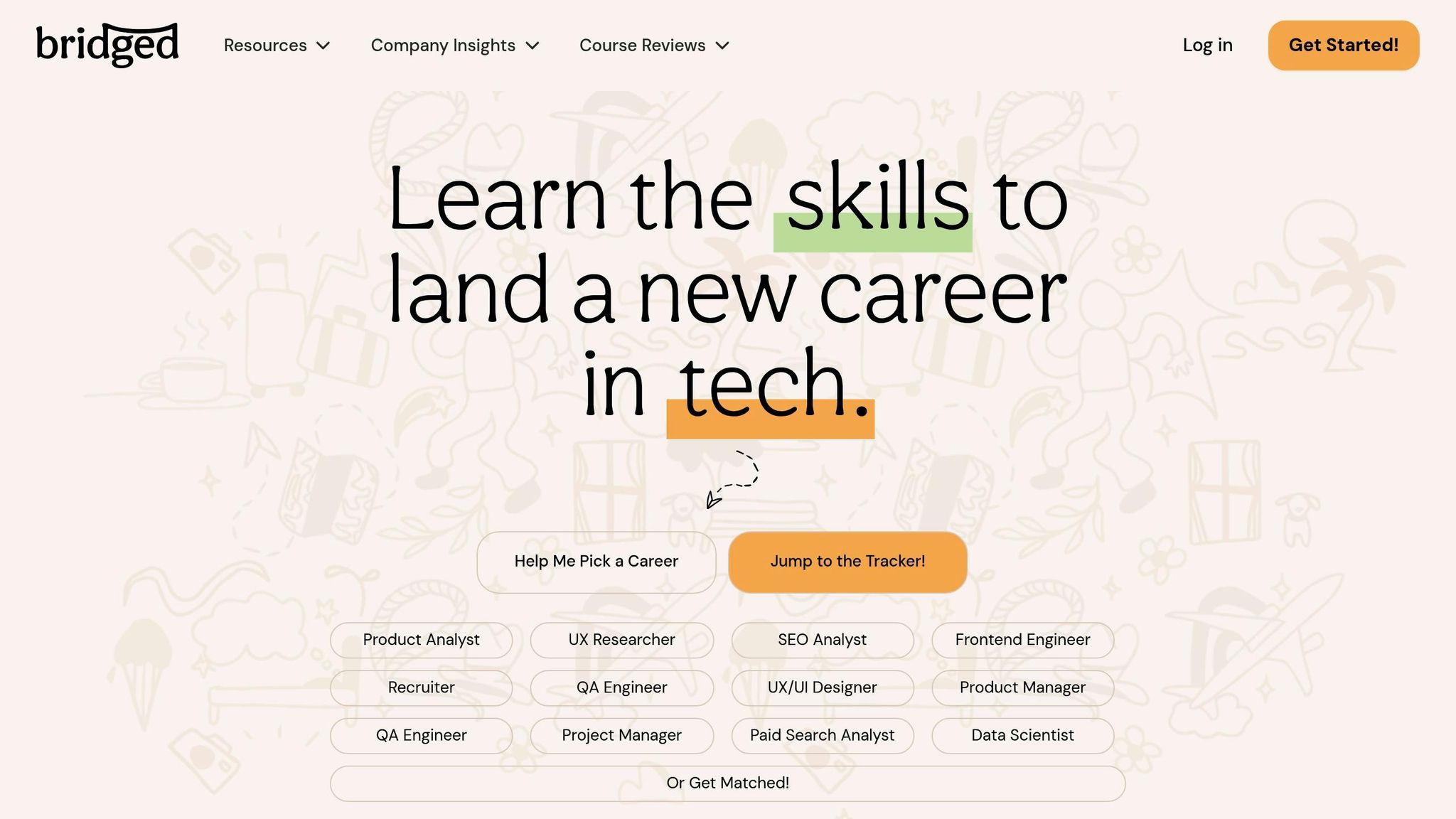
Bridged focuses on helping tech professionals map out competitive career paths by identifying transferable skills and pinpointing any gaps in training or certifications. Its skill gap analysis ensures that job seekers know exactly what they need to qualify for their target roles.
What sets Bridged apart is its connection to vetted employers, ensuring candidates are matched with companies that have proven credibility. This saves time for both job seekers and recruiters while fostering meaningful connections. Plus, Bridged’s career path quiz is a great tool for exploring new opportunities, especially for those considering a shift within the tech industry.
Dice
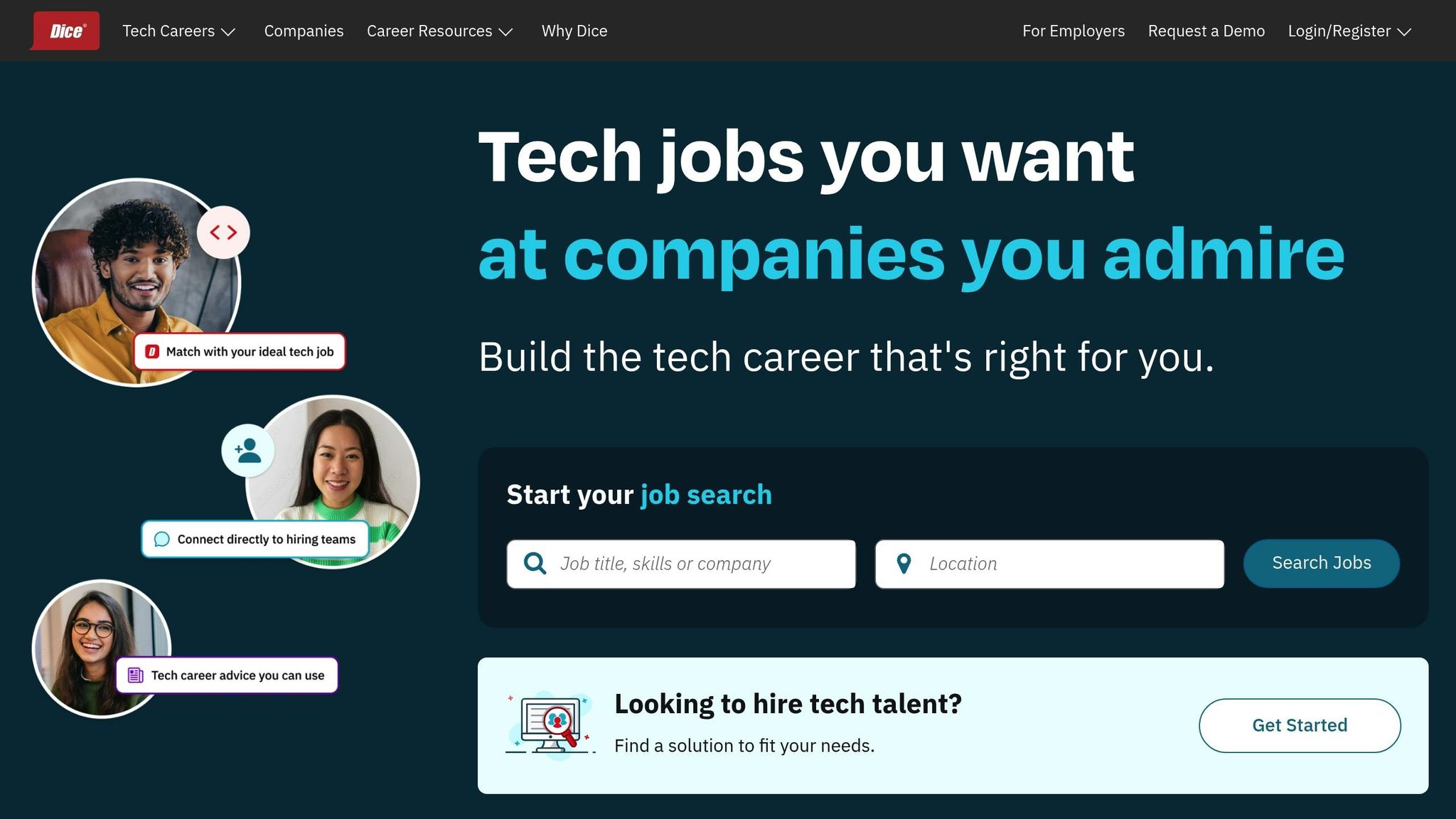
Dice has been a go-to platform for tech recruiting for more than 20 years. It processes thousands of technical job postings daily and offers advanced filtering options, allowing candidates to search by programming languages, frameworks, and experience levels.
For recruiters, Dice provides an all-in-one dashboard that integrates with applicant tracking systems (ATS) and syndicates job postings across numerous sites, boosting visibility. The platform also offers tools like salary insights and market data, making it easier to stay competitive. And with mobile accessibility, candidates can stay connected to opportunities wherever they are.
Levels.fyi
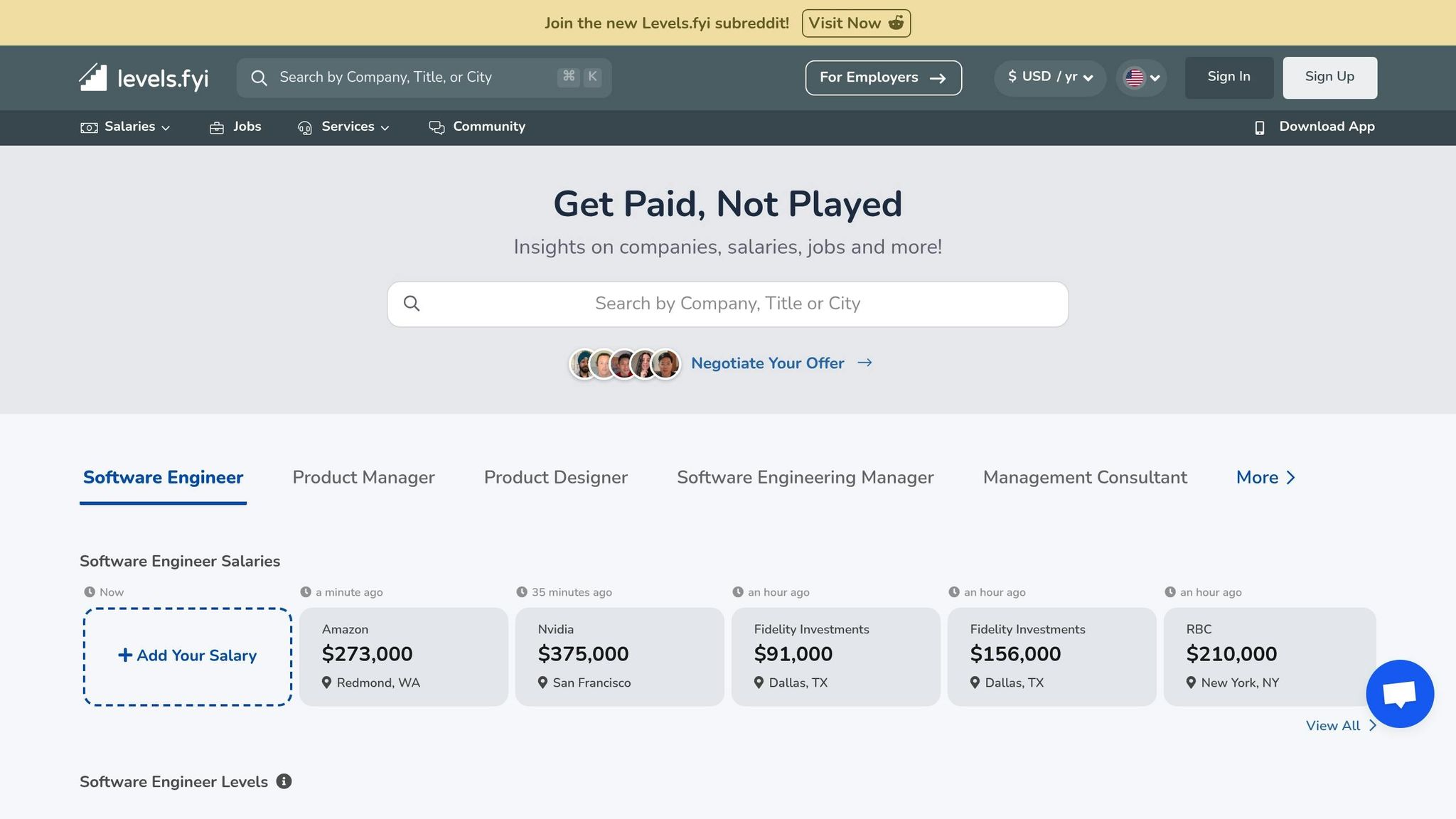
Levels.fyi is well-known for its real-time compensation insights, offering detailed information on what top tech companies pay for specific roles and experience levels. This transparency makes it a favorite for candidates focused on maximizing their earning potential.
The platform’s level comparison tool is a standout feature, helping both candidates and recruiters translate job titles and responsibilities across companies. This reduces confusion during negotiations and ensures clarity in expectations. Considering that 65% of developers cite salary as their main reason for seeking new roles, Levels.fyi is a valuable resource for both sides of the hiring process.
TechFetch
TechFetch operates as a curated marketplace, connecting recruiters with pre-screened technical talent. Their rigorous screening process includes technical assessments and skill verification, cutting down the time spent on initial evaluations.
Specializing in both contract and permanent IT roles, TechFetch has a strong focus on areas like cybersecurity, cloud computing, and enterprise software development. Recruiters also build ongoing relationships with candidates, offering insights into market trends and salary expectations. This approach aligns with the fact that while 80% of developers aren’t actively job hunting, over 50% remain open to new opportunities.
AngelList
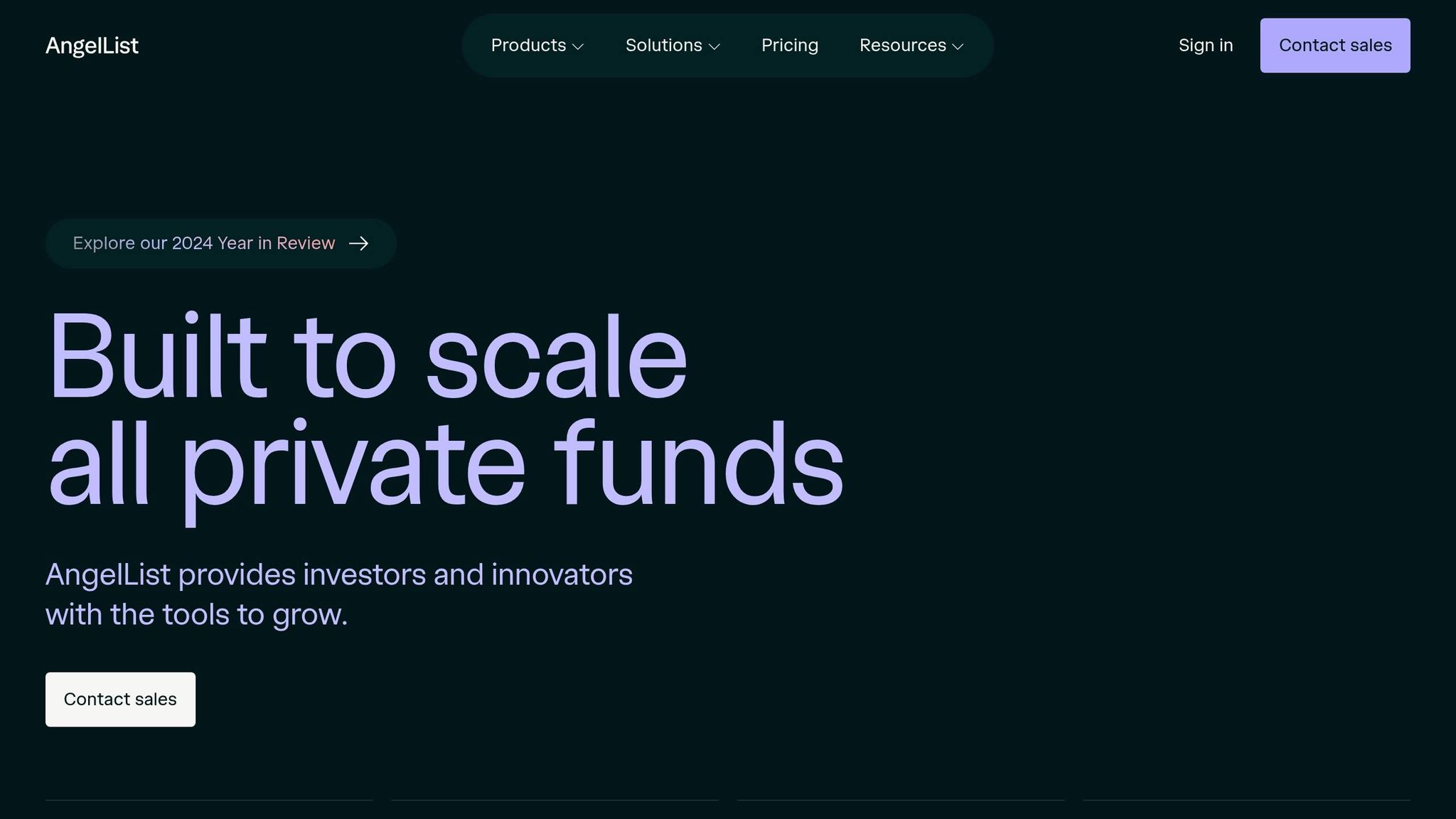
AngelList is the go-to platform for those interested in startup opportunities. It prioritizes transparency around equity, showing potential stock options and ownership percentages - key details for candidates evaluating startup roles.
The platform also highlights each company’s mission, team, and growth trajectory, giving candidates a clear picture of the startup’s culture and vision. Plus, AngelList facilitates direct communication between candidates and founders, creating a more personal and streamlined hiring process.
Built In
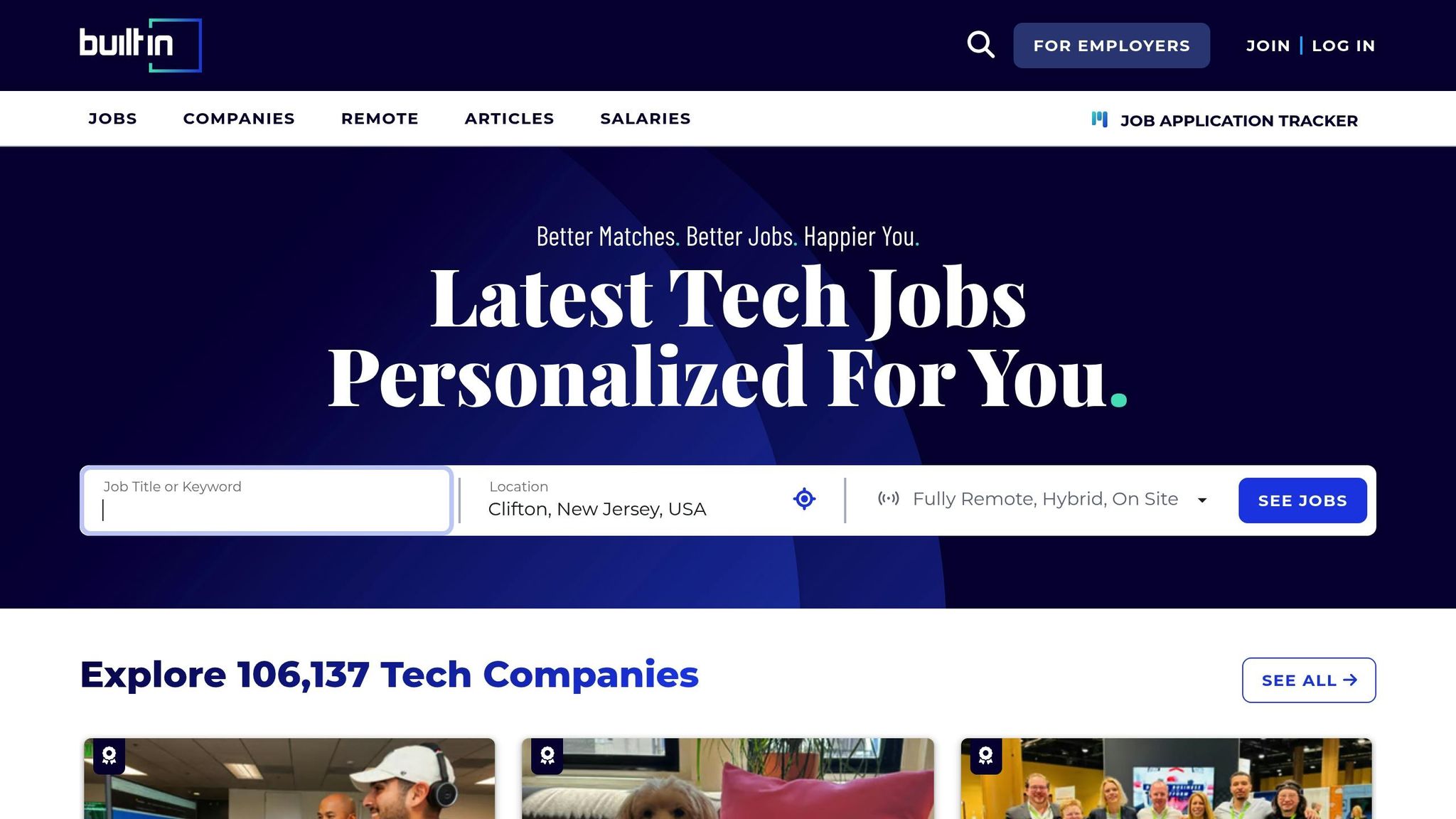
Built In focuses on regional job boards for major tech hubs like Austin, Boston, Chicago, and San Francisco. This geographic focus allows recruiters to target candidates already in - or willing to relocate to - these key markets.
The platform’s company culture profiles offer detailed insights into work environments, benefits, and team dynamics, helping organizations attract talent that aligns with their values.
Stack Overflow Jobs
Stack Overflow Jobs leverages its massive developer community to connect recruiters with candidates based on their actual coding activity and expertise. The platform evaluates contributors through their reputation scores, badges, and forum involvement, providing a data-driven assessment of skills.
This approach goes beyond traditional resumes, helping recruiters find developers who are not only highly skilled but also actively engaged in the tech community. Integration with the main Stack Overflow site adds to its appeal, especially since 60% of developers say they’d be discouraged if they couldn’t access Stack Overflow.
sbb-itb-8dc0621
How to Succeed on Specialized Job Boards
Once you've identified the right specialized platforms, the next step is making the most of them. Success on these job boards requires a mix of strategic profile building, networking, and mastering the tools they offer.
Creating a Strong Profile
Think of your profile as your digital handshake - it’s the first thing recruiters notice. A well-crafted profile quickly highlights your qualifications and makes your value clear.
Start with a headline that grabs attention. Instead of just listing your job title, add details that showcase your expertise. For example, instead of "Software Engineer", try something like, "Full-Stack Developer | React & Node.js | 5+ Years Creating Scalable Web Apps." This instantly communicates your skills and experience.
Be specific when listing your skills. Include programming languages, tools, and frameworks - like Docker, Kubernetes, or AWS - to make your expertise stand out.
Your summary is the place to highlight your career story and achievements. Use numbers to show your impact, such as, "Reduced page load times by 40% for an e-commerce site serving over 100,000 daily users." Quantifiable results help recruiters see the value you bring.
Don’t forget certifications and ongoing education - they can make a big difference. Platforms like Bridged can help you identify skill gaps and suggest certifications that improve your visibility in recruiter searches.
Lastly, include links to your GitHub, portfolio, or personal website. Many specialized job boards allow you to showcase your work, giving recruiters a direct look at your skills in action.
Connecting with Communities and Recruiters
Networking is a game-changer in job hunting. With 85% of jobs filled through networking and 70% of positions never advertised publicly, connecting with others can unlock opportunities you won’t find elsewhere.
Specialized job boards often have built-in community features. Use these to build relationships and increase your chances of landing referrals, which can make you 4 to 9 times more likely to get hired.
Be proactive. Send personalized connection requests mentioning specific roles or technologies you’re interested in. Join industry groups and attend virtual events - 68% of recruiters say these events help them find top-level candidates.
Make sure your LinkedIn profile aligns with your job board profiles to create a cohesive online presence. Also, share relevant content on social media - 61% of professionals are more likely to engage with recruiters who do so.
Using Platform Tools to Find Jobs
Specialized job boards come with tools that can make your search more effective. Use advanced filters, job alerts, and salary research tools to find roles that fit your skills. For example, Dice allows you to filter by programming languages, frameworks, and experience levels to pinpoint the right opportunities.
Set up job alerts with targeted keywords and locations so you’re notified as soon as a relevant position is posted. Salary research tools, like Levels.fyi, can help you understand compensation trends and prepare for negotiations.
Many platforms also offer unique features. TechFetch, for instance, provides instant IT skills assessments and a DemandIndex to gauge your marketability. Built In and AngelList let you research companies in-depth, offering insights into their work environments and goals.
AI-powered tools are becoming more common, too. For example, SmartJobBoard uses AI to analyze your profile and recommend jobs based on your skills and experience. Regularly updating your profile ensures these recommendations stay accurate.
Don’t overlook mobile apps - they make it easy to respond to opportunities quickly, which is crucial in competitive fields. By using these tools and staying active, you’ll stay on the radar of recruiters who frequent these platforms.
Choosing the Right Platform for Your Career
Picking the right job board can make all the difference in your career search. With 97% of tech hiring managers actively recruiting and tech jobs projected to grow steadily through 2033, selecting a platform that aligns with your goals is key. As previously mentioned, specialized job boards are designed to connect you with recruiters who understand the nuances of tech roles, making your search more efficient and targeted.
Industry-specific platforms are particularly valuable. They help you zero in on opportunities that match your expertise by linking you with recruiters actively seeking your skills. For professionals eyeing fields like AI, blockchain, or cybersecurity, niche platforms can be game-changers. Consider cybersecurity, for instance - there are an estimated 4.8 million unfilled positions worldwide. Platforms catering to these specialties can help you stand out in competitive markets.
Your work preferences should also guide your decision. If you're looking for remote opportunities, explore platforms focused on distributed teams. On the other hand, if you're drawn to startup culture, boards that cater to early-stage companies may be a better fit. Interestingly, 85% of job seekers prefer employers who align with their personal values, so finding a platform that connects you with like-minded companies can be a huge plus.
Experience level is another important factor. Some boards are better suited for entry-level candidates, while others focus on senior roles. Look for platforms that let you filter opportunities by experience and offer salary transparency. This way, you can target roles that fit your career stage and financial expectations.
Company size preference also plays a role. If you thrive in fast-paced environments, startup-focused boards can connect you with companies where you can make a direct impact. As one developer shared, joining a startup allows you to play a pivotal role in its success. Alternatively, enterprise-focused boards typically offer more structured career paths and established processes, which might appeal to those seeking stability.
For many, diversity and inclusion are non-negotiable. Platforms that highlight equitable hiring practices can help you connect with employers who are committed to building inclusive workplaces, aligning with your values and priorities.
Platform Comparison Table
| Platform | Target Roles/Industries | Access Requirements | Key Features | Typical Hiring Companies |
|---|---|---|---|---|
| Bridged | Technical roles across industries | Open access | Career path exploration, skill gap analysis, certification guidance, job matching with vetted companies | Vetted tech companies |
| Dice | Software development, IT, cybersecurity | Open access | Programming language filters, salary research, 200,000+ monthly job postings | Tech companies, enterprises |
| Levels.fyi | Software engineering, product management | Open access | Salary transparency, compensation data, company insights | FAANG, major tech companies |
| TechFetch | IT professionals, software developers | Open access | Instant skills assessments, DemandIndex marketability gauge | IT services, consulting firms |
| AngelList | Startup roles, early-stage companies | Open access | Company culture insights, equity information, direct founder contact | Startups, venture-backed companies |
| Built In | Tech roles in specific cities | Open access | Local market focus, company culture content, startup to enterprise | Local tech ecosystems |
| Stack Overflow Jobs | Developers, engineers | Open access | Developer-focused community, technical skill matching | Software companies, dev teams |
To get the most out of your job search, start with niche boards tailored to your industry or work style. Once you've explored those, broaden your search to include platforms with wider coverage. This way, you'll capture both specialized opportunities and a broader market view.
Keep in mind that tech talent is in demand across industries beyond traditional tech. Sectors like healthcare, finance, and manufacturing are increasingly seeking tech professionals. Platforms focused on these areas often emphasize applying technical skills within established business frameworks, offering unique opportunities for growth and impact.
Conclusion: Finding Better Job Opportunities
Specialized job boards open doors to opportunities that often fly under the radar - up to 80% of job openings aren't publicly advertised, and networking accounts for 70% of remote hires. This reinforces the idea that niche platforms often outperform general job boards when it comes to connecting tech professionals with targeted roles.
The tech job market has shifted dramatically. Candidates are now more selective about where they apply, prompting recruiters to rely heavily on these specialized platforms to find skilled and motivated talent. These boards go beyond simply listing jobs - they foster environments where recruiters actively search for candidates who meet their exact needs, often reaching out directly to qualified professionals.
To maximize your chances, adopt a proactive, multi-platform strategy. Don’t stick to just one job board. Each platform caters to different technical niches, and using several increases your visibility. This broader exposure gives you a better chance of catching the attention of recruiters.
But here’s the thing: uploading your resume isn’t enough. To stand out, you need to actively participate. Join discussions, take advantage of tools like skills assessments, and showcase your expertise. These actions send a clear signal to recruiters that you’re not just looking for a job - you’re engaged and serious about your field.
Modern platforms are also leveraging advanced technology, like AI-powered matching tools, to refine the job search process. These tools analyze your skills and career goals to present opportunities you might otherwise miss. For recruiters, this means they can focus on building meaningful relationships with candidates who are a perfect fit, leading to better job matches and more competitive offers.
If you want to stand out, focus on engagement. Choose platforms that align with your technical expertise, keep your profiles up to date, and connect directly with recruiters. The more you engage, the better your chances of landing roles that align with your career aspirations. Opportunities are out there - meet them where they’re waiting.
FAQs
What makes specialized job boards better for finding tech talent compared to general ones?
Specialized job boards are designed to cater to specific industries or skill sets, such as technology, offering a more focused approach for both recruiters and job seekers. These platforms typically provide curated job listings and advanced search tools, making it easier to connect with candidates who have the precise qualifications needed for niche roles. This targeted approach can save time and lead to stronger matches between employers and applicants.
On the other hand, general job boards cover a broad spectrum of industries and roles. While they attract a larger audience, they often result in a higher volume of less relevant applications. For those in competitive technical fields, specialized boards can offer a distinct advantage by providing access to more tailored opportunities and reducing the noise of irrelevant listings.
How can job seekers stand out and succeed on niche job boards?
To make the most of niche job boards, start by selecting platforms that match your industry and area of expertise. Focus on building a detailed and customized profile that showcases your skills and experience. Use specific keywords tied to your field to improve your visibility to recruiters.
Stay active by networking with other professionals, joining discussions, and reaching out to recruiters when it feels appropriate. Make sure your personal brand stays consistent across all profiles and applications - it can leave a lasting impression. With a proactive and thoughtful approach, you can uncover hidden opportunities and connect with the recruiters who matter most.
What unique features do specialized job boards offer to help recruiters find top candidates more effectively?
Specialized job boards are built to help recruiters find the perfect candidates more quickly and efficiently. By focusing on specific industries or skill sets, these platforms make it easier to connect with talent that aligns with precise job requirements.
Some standout features include detailed candidate profiles, resume databases, and customizable alerts for new job postings. Many of these boards also offer keyword matching tools, which simplify the search process and save valuable time. With these tools, recruiters can zero in on the most relevant candidates and streamline the hiring process.









